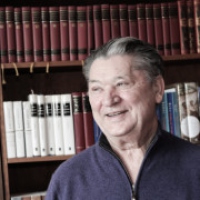Árpád Kadarkay
ÁRPÁD KADARKAY (Kesztölc, 1934). Though an outstanding student in the gymnasium in Esztergom, his university application in Cold War Hungary was returned as that of a “classalien,unqualified”. He became a miner in the coal pits of Dorog and Csolnok, “the pits of hell”. Conscripted into the Hungarian Army, 1954–56, he deserted in November 1956 and joined the Revolution. After the Soviet invasion, he emigrated to Vancouver, British Columbia, in March 1957. While working the graveyard shifts at Eburne Saw Mills, Vancouver, he earned Double Honours at the University of British Columbia,1958-1963, and on a fellowship, an MA in Political Science at UC Los Angeles, 1963–65, and a PhD in Political Philosophy, UC Santa Barbara, 1965–1971. He is Emeritus Professor of Politics and Government at the University of Puget Sound, and lives in Tacoma, Washington. He did his research on György Lukács on IREX Fellowships. His publications include Georg Lukacs: Life, Thought, and Politics (Oxford: Blackwell, 1991), The Lukacs Reader (Blackwell, 1995), Human Rights in American and Russian Political Thought (University PressofAmerica, 1982),and an English translation of Journey in North America, 1831, by Sándor Bölöni Farkas (Santa Barbara, 1978).

